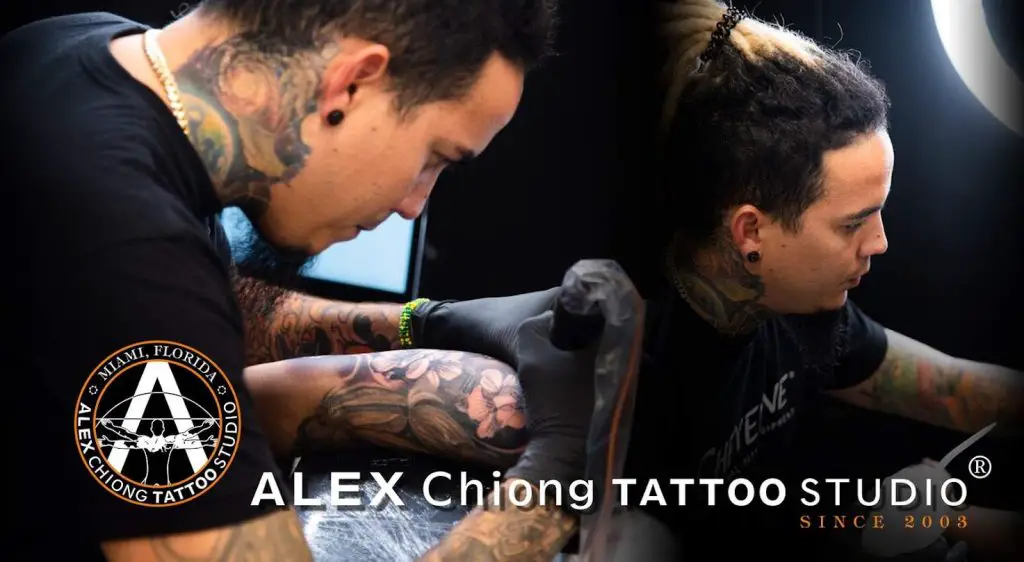We can learn more about tattoos’ requirements and expectations by conducting interviews. Tattoo expert interviews are also commonly utilized to obtain information about this service in order to comprehend its benefits and drawbacks.
Today’s guest is Alex Chiong. He has almost 15 years of experience and has won numerous honors at major tattoo conventions. He sacrificed his valuable time to understand better some fundamental concepts and how he used to deal with them.
How it all started
Basically, I’ve finished my academic studies at San Alejandro Academy of Fine Arts in 2012. In 2003, I began working as a tattoo artist in Havana. I moved to Miami a few years ago. My interests include painting and music and socializing with my pals at parties. Nature and animals are two of my favorite things. I meditate and think about my work while breathing in fresh air and gazing at the sea. I also enjoy working out and staying fit. As you can see, I’m passionate about the arts and that’s how it all started basically. During my last years in Miami, I worked as a tattoo artist. I worked in prominent tattoo studios. As a result of my participation in several Tatuje events, I was able to win several significant accolades, including the “New York No Limits 2016” second prize.
After that, in 2017, I took the plunge and started my own business. Most significantly, it has been to express my perspective on this art and to stamp my own identity inside the competitive arena into which I have pushed myself.
1. What steps should you take before applying for a tattoo?
These are the few steps that I used to take before applying tattoo,
- Maintain your personal hygiene. Showering before each session is strongly advised. Before your appointment, keep your tattooed area clean. Throughout the day, dead skin cells, perspiration, and debris accumulate on your skin. If you haven’t bathed, you risk these particles entering the tattooed region and developing an illness. Showering before each session is strongly advised.
- Get enough sleep and arrive rested. Most of the tattoo pain will be felt by your body. You must make certain that it is well-rested. Get at least 8 hours of sleep the night before your tattoo.
- Do not consume alcohol for at least 24 hours before and after tattooing. Drinking before getting a tattoo has several negative consequences on your body and mind that you should avoid. Because your blood is thinner, it is considerably more difficult to get ink into your skin.
- Eat something before coming. Coming on an empty stomach is not recommended. It is recommended that you eat one to two hours before your visit, and that you consume a meal high in protein and vegetables.
- Try to bring good skin. Sunburn, redness, or irritation are not permitted. We do not encourage getting tattooed on a sunburned area and reserve the right to refuse anyone who thinks they will be alright with it for some bizarre reason. Sunburned skin is damaged, sore, and uneven. As the skin ages, it produces even more melanin.
2. How do you ensure that clients do not suffer allergic reactions to the ink used in tattoo applications?
Allergic responses do not usually arise on the initial exposure to tattoo ink. For example, if you have gotten three or four tattoos without incident, you may experience an allergic reaction to the ink the following time you get one. Each time you get a tattoo, you must be on the lookout for indicators of an allergy and seek medical attention depending on the severity of your reaction.
But Still I like to examine the skin properly by talking to the client and understanding their previous history if they had any kind of allergic problems or not. Medical reports will be a blessing if they have. And most important I advise them to apply well after-care products. There are so many good products around us. If they apply it properly it will be beneficial for them to reduce the chances of allergic reaction.
3. How do you ensure that clients approve of the modifications done to existing tattoos?
That’s easy. First, I used to listen to them and ask what they wanted from me. Because clients thought it was very important to satisfy them. Then I used to make a demo on their skin with a normal pen that how it’s gonna be. Or I use the stencil machine if the cover-up tattoo is totally different. So, the client can visualize properly and if they approve that yes this is good, then I start proceeding to make the original one.
4. How do you ensure that clients are safe during the tattoo application process?
Clients’ safety is important. And it’s our core responsibility. These are the basic steps that I used to follow,
- Before beginning, properly wash my hands with soap and water.
- While tattooing you, use single-use disposable gloves. When switching between tasks and clients, gloves must be changed.
- Never put needles into ink bottles and always use disposable ink caps.
- At the start of each service, we use new ink caps.
- In case If I had to pause to do something else, I wash my hands or use hand sanitizer and change my gloves before starting work on my tattoo or skin.
- To remove gel or cream from containers, I use clean gloves or wooden sticks.
- To dispose of the needles, I use puncture-resistant biohazard containers.
5. How do you deal with a client?
One of the most important works. I will say it’s more necessary than making a tattoo because there are a lot of artists who can art but all of them can deal with clients properly. These are the ways I like to deal with them.
- Try to establish trust. Take all inquiries seriously and listen carefully. Give them suggestions on how to prepare for the session (comment on food, rest, and appropriate clothing).
- You must provide a comfy seat or stretcher for the customer so that they are not uncomfortable during the procedure.
- Have a pleasant conversation so that the victim relaxes and forgets about the discomfort the punctures are creating. Stop and talk about it until you reach an agreement if the customer is in too much discomfort.
- You must always keep the workstation clean, not just for the sake of your client’s health, but also for your own.
- Provide your customers with a means of communication (phone, social media) so that they can clarify questions before and after the session.
- Try to provide privacy and make the tattoo in an environment where others are not present. If you have a small space, attempt to divide it with folding screens.
- Never put the client under any kind of duress. They may have second thoughts about getting tattooed, which is great.
- Avoid being persuasive and pushy when you believe your point of view is superior. Because it is their body, the person who will be tattooed makes the decisions.
- Allow customers to share their experiences with you. You can leave a space on a social network or at your studio for them to express themselves publicly and visibly.

My name is James Dalton specialize in developing research-based content on the fashion & lifestyle industry. And has good experience in tattooing. Tattooing is my hobby and worked for some years as a tattoo artist.

